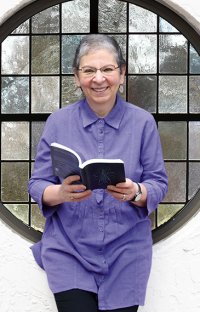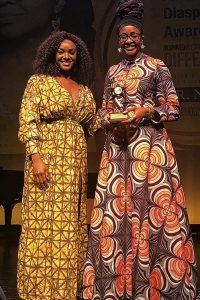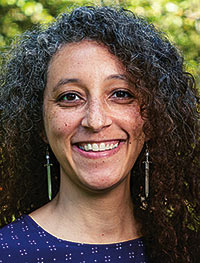Nancy Pearl: Elastic Realism
 Librarian, author, and critic Nancy Pearl was born January 12, 1945 and grew up in Detroit MI, spending much of her childhood in the public library. She decided to become a librarian at age ten, and got her Master’s degree in Library Science at the University of Michigan in 1967 (she later earned another Master’s in history). She worked as a librarian in Detroit and as a librarian and bookseller in Tulsa OK before moving to Seattle WA in 1993, where she initiated the ‘‘If All Seattle Read The Same Book’’ project in 1998, later adopted widely as ‘‘One City, One Book’’ programs nationwide. Pearl served as executive director of the Washington Center for the Book until 2004, when she retired to focus on her writing and reading advocacy. She frequently appears on public radio programs to discuss literature and recommend books.
Librarian, author, and critic Nancy Pearl was born January 12, 1945 and grew up in Detroit MI, spending much of her childhood in the public library. She decided to become a librarian at age ten, and got her Master’s degree in Library Science at the University of Michigan in 1967 (she later earned another Master’s in history). She worked as a librarian in Detroit and as a librarian and bookseller in Tulsa OK before moving to Seattle WA in 1993, where she initiated the ‘‘If All Seattle Read The Same Book’’ project in 1998, later adopted widely as ‘‘One City, One Book’’ programs nationwide. Pearl served as executive director of the Washington Center for the Book until 2004, when she retired to focus on her writing and reading advocacy. She frequently appears on public radio programs to discuss literature and recommend books.
Pearl teaches in the Information School at the University of Washington, and has written several books on reading, including Now Read This: A Guide to Mainstream Fiction 1978-1998 (1999), Now Read This II: A Guide to Mainstream Fiction 1990-2001 (2002), Book Lust: Recommended Reading for Every Mood, Moment and Reason (2003), More Book Lust (2005), Book Crush: For Kids and Teens (2007), Now Read This III: A Guide to Mainstream Fiction 2001-2009 (2010), and Book Lust to Go: Recommended Reading for Travelers, Vagabonds, and Dreamers (2010). Her book reviews have appeared in Booklist, Library Journal, and The Seattle Times, among other publications. In January 2012, Amazon Publishing announced the Book Lust Rediscoveries program, which publishes out-of-print titles selected by Pearl, who also provides introductions and reading guides.
Pearl has won many awards and was named Librarian of the Year by Library Journal in 2011. Her face has appeared on an American Library Association Poster, and her likeness was used for a librarian action figure by toy company Archie McPhee in 2003. She lives in Seattle with her husband Joe Pearl; they have two adult children, and three grandchildren.
‘‘Books have always been an escape for me – from reality, from the world. There were wonderful children’s librarians at the Parkman branch of the Detroit Public Library who opened the world of books and reading to me, and gave me a safe place to be where I felt accepted and cared for – which I didn’t feel so much at home. Going there was a way to escape the world, and that’s where I discovered science fiction.
‘‘As a child, I was so excited to read adult books. At that library, you had to be 13 or in the 9th grade to go into the adult section. I remember saying to my children’s librarian, Miss Whitehead, ‘Could I go over to the adult side to check out books now?’ And very grudgingly she said yes. Now, she wasn’t grudging because she thought there were books there I shouldn’t read. She felt that if I started reading adult books, I would never come back to the children’s books, and there were still so many that she wanted to give me. But she took me over to the adult section and introduced me to the librarians, and let me roam free to check out whatever I wanted.”
…
 ‘‘I have always liked all the genres except down and dirty horror. That is something I have never gotten into, although I do appreciate Stephen King’s storytelling talents. I really loved Lisey’s Story, for example. He has this wonderful ability to tell a story in such a way that you’re forced to turn the page, even though everything in you says, ‘No, don’t turn the page, I don’t want to find out what happens!’ Besides the horror genre, another genre I don’t read a lot of is romance, although I’m a huge fan of Georgette Heyer.
‘‘I have always liked all the genres except down and dirty horror. That is something I have never gotten into, although I do appreciate Stephen King’s storytelling talents. I really loved Lisey’s Story, for example. He has this wonderful ability to tell a story in such a way that you’re forced to turn the page, even though everything in you says, ‘No, don’t turn the page, I don’t want to find out what happens!’ Besides the horror genre, another genre I don’t read a lot of is romance, although I’m a huge fan of Georgette Heyer.
‘‘Everything else I just read – well, I won’t say indiscriminately. I definitely read discriminately, but I read many different types of books. I’ve always felt that slogging your way through a book because it won an award, or because someone said it’s the best book they’ve ever read, or it’s on the top of the bestseller list, is just not worth your time. I was on the radio once saying just that, and we were taking phone calls, and a woman said, ‘So how much should I read?’
‘‘On the spur of the moment I came up with the 50-page rule, which is that if you’re 50 years of age and under, you should give a book 50 pages. And if you still like it at the bottom of page 50, go on and read it, but if all you care about is who the murderer is, or who gets married to whom, turn to the last page. Our government and the Internet know many things about us, but whether or not we finish a book that we return to the library is something nobody can yet tell. And then, when you’re over 50, you subtract your age from 100, and read at least that far. That number, which gets smaller every year, is our reward for getting older. And best of all, if you’re 100, you can judge a book by its cover. I said that once in a speech, and my husband’s aunt was there, and she was at that point 98, fully rational, and she thought that was very funny.”
…
‘‘I think about books in terms of what the biggest entry point into a particular title is. Is it story-driven, is it character-driven, or is it about the setting and world-building? I am not someone who reads for setting, despite the fact that I like both historical fiction and SF/fantasy. But if people read for setting, it links different parts of the collection together that you don’t often think about together, like historical fiction and science fiction. We think about SF/fantasy readers as not necessarily being historical fiction fans, but I suspect that what many SF/fantasy fans like is the world-building aspect of the novels they read. I would love to see a display called ‘Out of this World,’ with both historical fiction and SF, because there’s that lovely crossover.
‘‘The fourth big entry point is language. There are people – I am one – who read for the beauty of the language – people who just want to savor the words. They don’t necessarily care if there’s a strong plotline to carry them through. These are, of course, poetry readers. And all of those doorways – I call these entry points doorways – have non-fiction components, but you can meld them together, fiction and non-fiction, with the adroit use of displays. When I teach, I encourage the students to look at the world that way.”
…
‘‘I loved Emma Bull’s Territory. It was a Western about the OK Corral stuff, but with fantasy. I like historical novels that take a slight turn into fantasy. Guy Gavriel Kay does that so brilliantly. Tim Powers too. I was trying to think of a good description for it, because Magical Realism doesn’t really do it. I said that on Morning Edition once, and got a lot of suggestions. Someone said, ‘What about Elastic Realism?’ I thought that was a perfect description for what Guy does, and what Territory is. I want Emma to finish the sequel! After you read Territory you never look at Wyatt Earp the same way.
‘‘I just want people to read everything that I love. Is that incredibly selfish of me?’’








Pingback:Nancy Pearl: Realismus elastischen